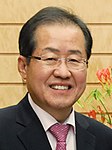This article, providing no source on the electoral results, needs additional citations for verification. (June 2018) |
| |||||||||||||||||||||||||||||||||||||||||||||||||||||||||||||||||||||||||||
All 17 metropolitan mayors and governors (All 3,977 seats of provincial and municipal leaders and councillors) | |||||||||||||||||||||||||||||||||||||||||||||||||||||||||||||||||||||||||||
|---|---|---|---|---|---|---|---|---|---|---|---|---|---|---|---|---|---|---|---|---|---|---|---|---|---|---|---|---|---|---|---|---|---|---|---|---|---|---|---|---|---|---|---|---|---|---|---|---|---|---|---|---|---|---|---|---|---|---|---|---|---|---|---|---|---|---|---|---|---|---|---|---|---|---|---|
| Turnout | 60.2% | ||||||||||||||||||||||||||||||||||||||||||||||||||||||||||||||||||||||||||
| |||||||||||||||||||||||||||||||||||||||||||||||||||||||||||||||||||||||||||
 | |||||||||||||||||||||||||||||||||||||||||||||||||||||||||||||||||||||||||||
| This article is part of a series on |
 |
|---|
|
|
The 7th local elections were held in South Korea on 13 June 2018. The election coincided with the by-elections for the vacant seats in the National Assembly.[1] The election was a landslide victory for the Democratic Party of Korea, the ruling party, after two successful summits with the third inter-Korean summit on 27 April and the first North Korea-United States summit in Singapore on 12 June.[2]
- ^ "<막 오른 지방선거 레이스>재보선 10곳 이상 내년 지방선거는 거물급'미니총선'". Munhwa Ilbo. Naver. Retrieved 25 December 2017.
- ^ Jung, Kwangho; Kang, Youngju (2020). "A report of the 2018 regional election in South Korea". Regional & Federal Studies. 30 (3): 493–509. doi:10.1080/13597566.2020.1761341. ISSN 1359-7566. S2CID 219447359.




